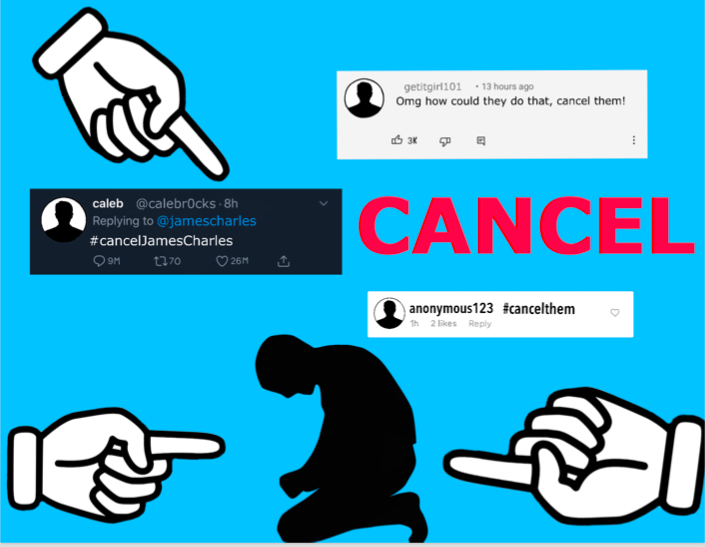Conversations with Caroline
The issues with Cancel Culture
What started as a joke on Twitter has now become a bigger problem than people ever imagined.
September 21, 2020
Social media heavily influences just about everything and everyone around us. It provides a place for people to share what is going on in their lives and figure out what is going on around them. It also allows people to share their opinions, but one wrong move on social media, and other people are going to ‘cancel’ them.
Cancel culture is a term used to describe when a group of people publicly shame celebrities on social media platforms about an offensive video or comment. People can be canceled for being homophobic, racist, transphobic, and so much more. This provides a public outlet where people can change the way our society sees certain topics and people. With this recent pandemic, people have been constantly on social media, making the issue of canceling influencers and businesses even worse.
One of the major problems that affects cancel culture is how hard it is to know what information is true, and what is drama and rumors. Cancel culture first started as a small joke on Twitter a few years ago, but it has become something even bigger now. People cannot post anything today without worrying that people may start attacking them. You have to be careful with jokes because it could be taken the wrong way by others. This is a constant worry for influencers because just one comment could ruin their entire career and reputation across social media.
JK Rowling, the writer of the Harry Potter series, is one of the people who has been affected by cancel culture. After Rowling posted a transphobic comment on Twitter, she was bombarded by people saying that she needed to be cancelled. Even today, months after the first tweet she posted, Rowling is still receiving hate and cancel comments.
Last year, the beauty influencers James Charles and Tati Westbrooke got into an argument on YouTube. Tati posted a video where she accused James of sexually harassing other men and bullying other influencers. After hearing Tati’s side of the story, people began to cancel James, which caused his channel to lose about 3 million subscribers within a few hours of the video being posted. The next day, James Charles came out with an apology video, where he explained his side of the story and the misinformation that Tati had spread to everyone. There are many situations like this where the information given to cancel someone is rooted in drama.
And it is not just influencers that are being canceled; it is also ordinary people. Throughout quarantine, many new ideas have been going around social media. There have been many videos posted of people being racist and homophobic towards the person videoing. This has caused people to think about things another way, which sparked many of the protests this year. People will comment on the videos, saying they should cancel them, even though most of these videos are filled with random people, not influencers or celebrities.
There is a lot of gray area when it comes to cancel culture. For instance, there is no way to know what qualifies to be canceled, because social norms are rapidly evolving. One example is take an influencer who had made a post or video a few years ago that was offensive that resurfaced today, and the influencer has changed since. People have to question whether or not this influencer should be canceled. Cancel culture demands that influencers have to know and follow this certain set of rules in order to stay relevant. In addition to this, if they violate these rules, they must have done it intentionally to offend others. Another problem is canceling someone is a violation of freedom of speech. When you cancel someone, you are essentially telling them they have no right to express their own opinions because you do not agree with it.
We have to ask ourselves if it is really worth it to cancel people. They should be allowed to express their opinions without the feeling that their voice is being shut out by the world.

